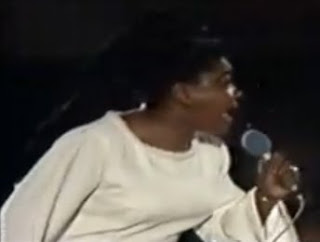By: Joseph Middleton
Easter is almost upon us. Come Resurrection Sunday, choir stands across the world will be filled with choirs and praise teams singing familiar songs such as “He Decided to Die (He Would Not Come Down From the Cross)” and and “For God So Loved the World”. For those who want to hear something from the Golden Era for Easter, here are a few songs that should satisfy the ears and the spirit.
1. "Christ The Redeemer" (1966) Rev. James Cleveland and the Walter Arties Chorale
Right at the end of the Golden Era, Rev. James Cleveland recorded this song with the Walter Arties Chorale. The arrangement is jazzy with cues taken from “Cristo Redentor”, and is less bluesy than other popular gospel recordings from the same time. The modern arrangement takes no luster away from this gem. The choir provides haunting, modulating ooohs throughout the song as James mournfully tells the story. This song has almost meditative qualities to it, and is an interesting departure from the usual Resurrection Sunday repertoire.
(Available from Savoy/Malaco on the “James Cleveland Sings with the World’s Greatest Choirs, 20th Anniversary” CD)
2. "The Crucifixion" (1954) The Caravans
During their second recording session with the States label, The Caravans sang of the Crucifixion. On lead, we have the group leader, Albertina Walker as solemnly, yet with the fervor of a minister with her trademark runs, tells the familiar story. On the piano, we have a young James Cleveland, in the background we have Cassietta George, Iris Humble, Gloria Griffin, and Johneron Davis with their sweet, heavenly background vocals.
(Not available on CD. Check eBay for availability of this recording.)
3. "The Crucifixion" (1957) The Roberta Martin Singers
With an intro featuring a throbbing organ being played by Little Lucy Smith Collier, the late, great Eugene Smith sings/narrates the Crucifixion in this recording taken from the Martin Singers’ first recording session with Savoy. In the background, Roberta Martin, Gloria Griffin, Delois Barrett Campbell, Little Lucy Smith Collier, Norsalus McKissick and Romance Watson support Smith’s lead with a cushioning cloud of hums, ooohs, and the occasional few words. Roberta glides over the piano keys and glides through the background with her unmistakable contralto accenting the ends of the vocalizations. Listen as the drummer provides sound effects for the nails being driven and for the sting of death in this quality recording done as only “Bert’s” group would have it done.
(No longer available on CD from Savoy/Malaco. Check eBay for the occasional copy. Album titled on CD as “Twelve Inspirational Songs” and on LP as “Spirituals”.)
4. "The Blood Will Never Lose Its Power" (1962) The CaravansOn this go-round, the girls (Albertina Walker, Shirley Caesar, Delores Washington, Cassietta George and Johneron Davis) sing this now familiar Andrae Crouch tune. Albertina provides the lead vocals as James Herndon’s skilled hands tear up the ivories and an uncredited organist provides twirling and booming accompaniment. Toward the end of the song, Cassietta chimes in to complement Albertina, putting the icing on the cake.
(Available from Savoy/Malaco on the “Best of the Caravans” CD.)
5. "No Greater Love" (1960) Rev. James Cleveland and the Voices of TabernacleNot to be confused with Keith Pringle’s 1988 hit of the same name, James Cleveland and Louise McCord lead the Voices of Tabernacle in this song taken from the early days of James Cleveland’s solo career. The song is rather simple and easy to remember. For those who are looking for a simple song for their choir or praise team to sing on Resurrection Sunday, this is a good candidate.
(Available on various vintage gospel compilation CDs. Check iTunes and other online music outlets.)
6. "He's Alive Today" (1965) The Caravans
We’re taking yet another jaunt with The Caravans, this time it’s a little different. Albertina has stepped aside and let one of the other group members lead and take the limelight. Even though the lineup is almost the same as the 1962 lineup for “The Blood Will Never Lose Its Power”, Johneron Davis has been replaced by the late Josephine Howard (mother of r&b songstress
Miki Howard). Josephine takes a commanding, authoritative lead and lets the listener know that He is indeed alive! Josephine’s squalls will surely take you in. You may end up putting this one on repeat.
(Not available on CD. Check eBay for the VeeJay LP containing this song titled “Let’s Break Bread Together”.)
7. "Calvary" (1967) Mahalia Jackson
No Golden Era playlist is complete without an entry from Mahalia Jackson. Recorded live in concert at the New York City Philharmonic Hall on March 26, 1967, Mahalia’s pianist Eddie Robinson and organist Charles Clency’s sparse musical accompaniment set a sobering scene that silences the performance hall as Mahalia sings. Compared to James Cleveland’s “Christ the Redeemer” from the previous year, this song sounds more traditional, and sounds typical of most of Mahalia’s later work.
(Available on Disc 1 of the Mahalia Jackson CD compilation tited “Gospels, Spirituals, and Hymns”.)













